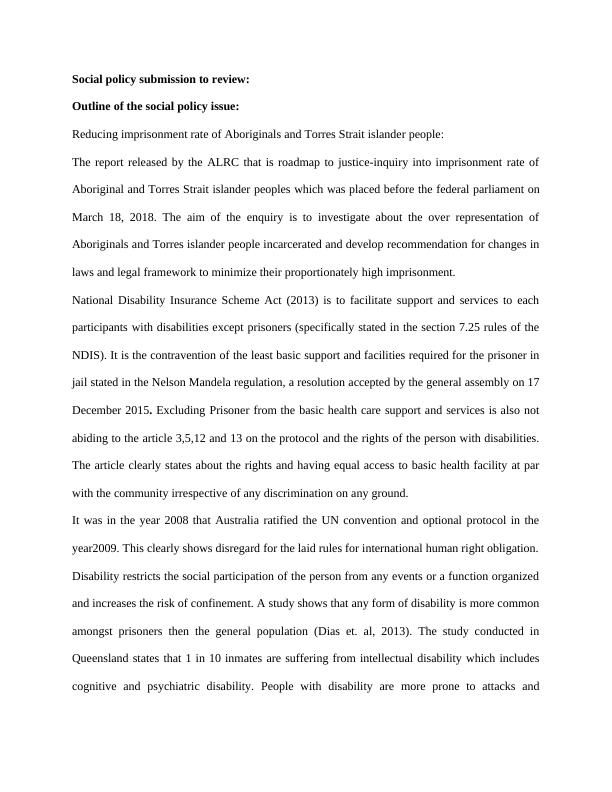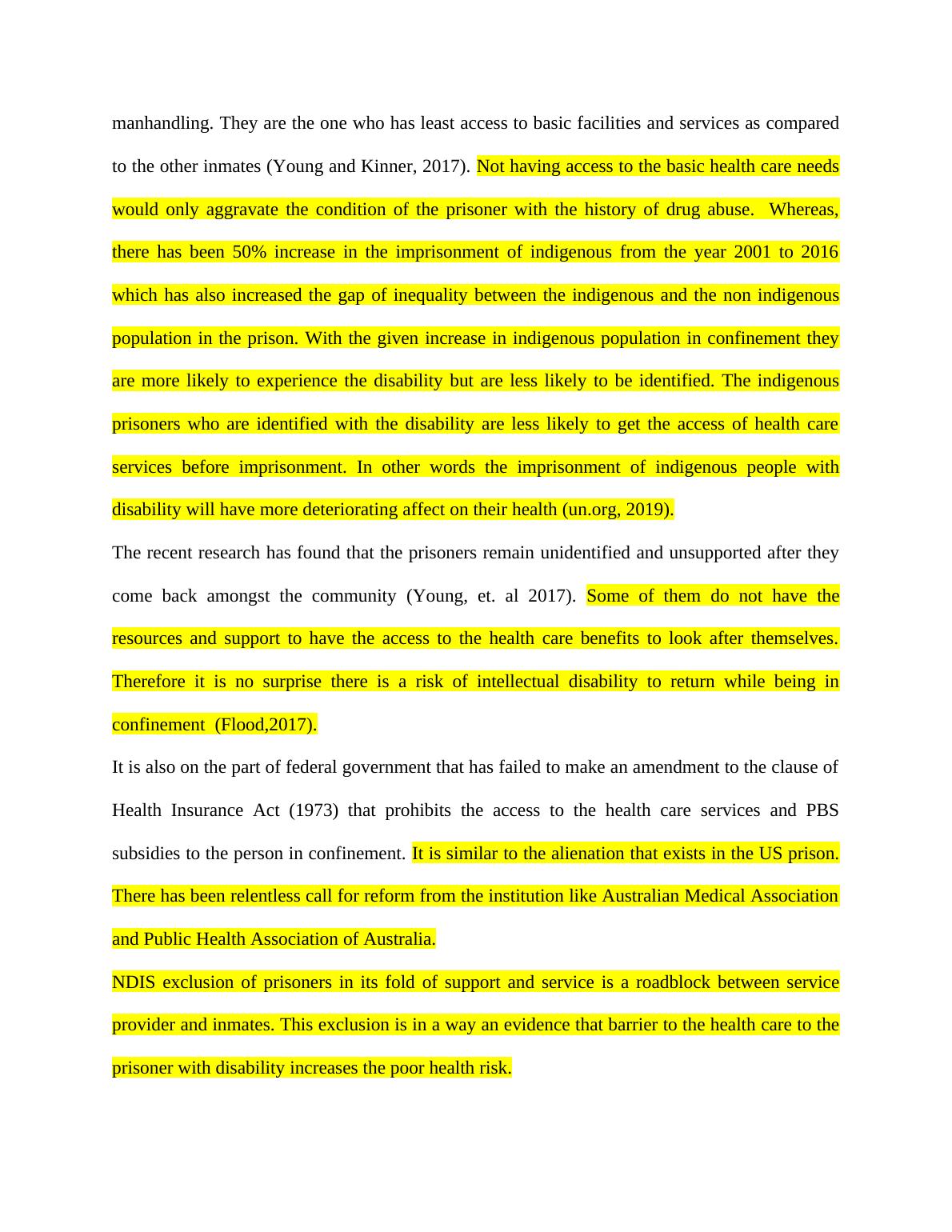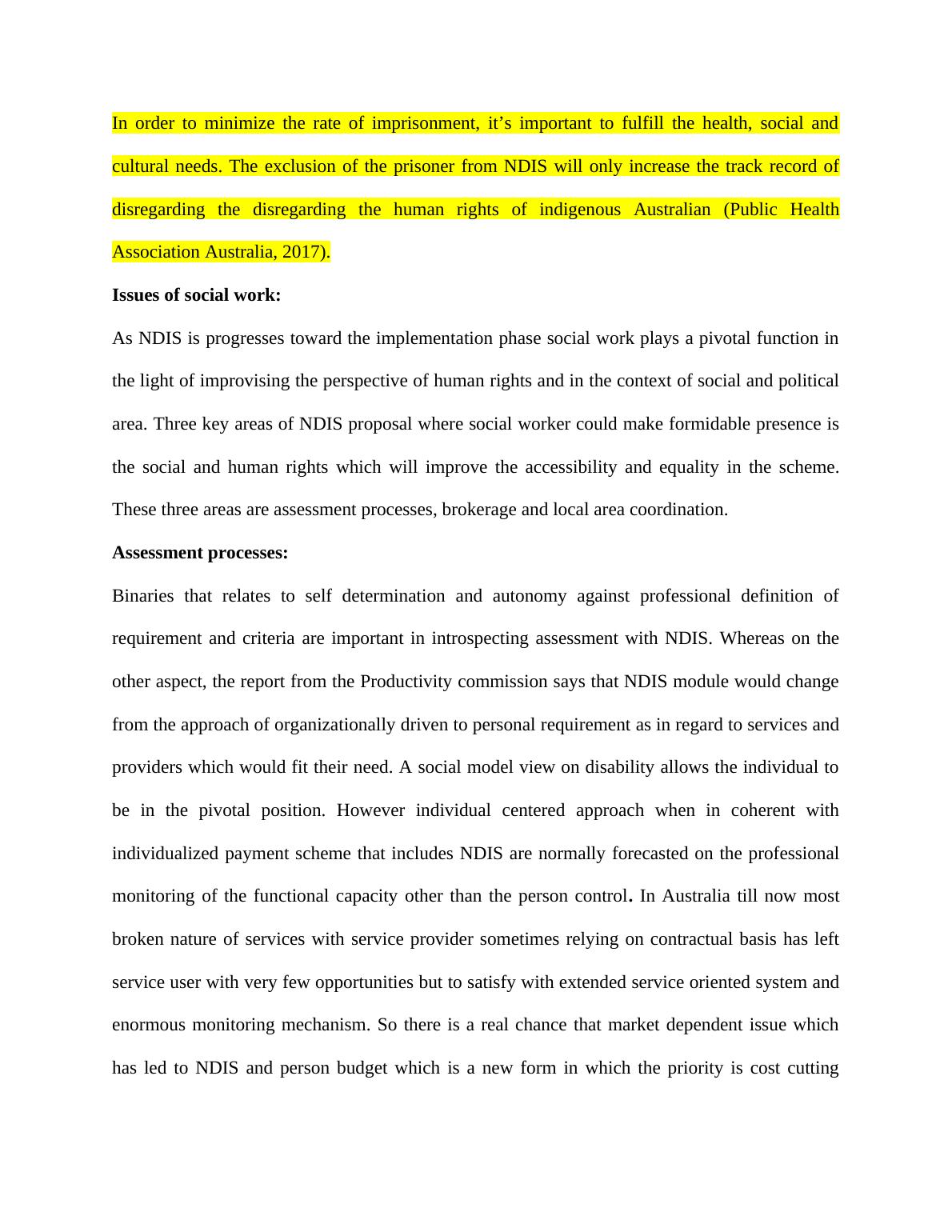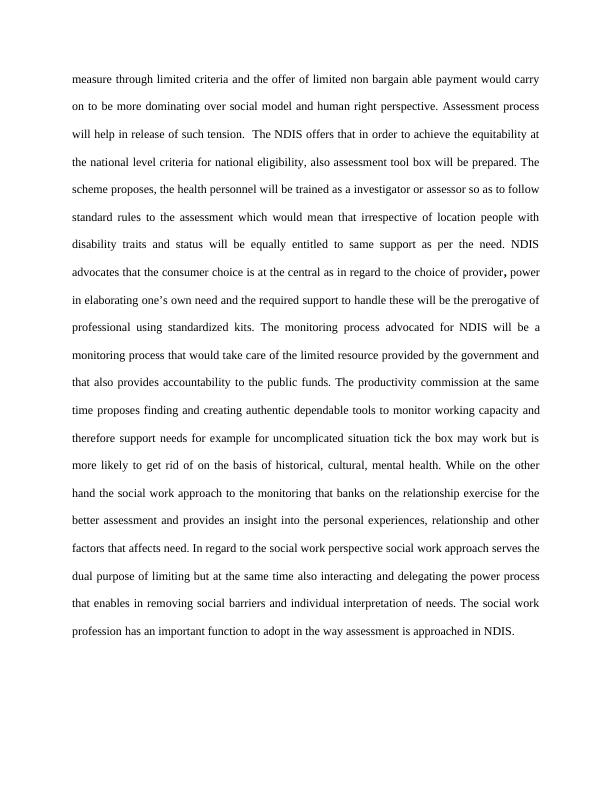Reducing Imprisonment Rate of Aboriginals and Torres Strait Islander People
Added on 2023-03-30
11 Pages2509 Words498 Views
Social policy submission to review:
Outline of the social policy issue:
Reducing imprisonment rate of Aboriginals and Torres Strait islander people:
The report released by the ALRC that is roadmap to justice-inquiry into imprisonment rate of
Aboriginal and Torres Strait islander peoples which was placed before the federal parliament on
March 18, 2018. The aim of the enquiry is to investigate about the over representation of
Aboriginals and Torres islander people incarcerated and develop recommendation for changes in
laws and legal framework to minimize their proportionately high imprisonment.
National Disability Insurance Scheme Act (2013) is to facilitate support and services to each
participants with disabilities except prisoners (specifically stated in the section 7.25 rules of the
NDIS). It is the contravention of the least basic support and facilities required for the prisoner in
jail stated in the Nelson Mandela regulation, a resolution accepted by the general assembly on 17
December 2015. Excluding Prisoner from the basic health care support and services is also not
abiding to the article 3,5,12 and 13 on the protocol and the rights of the person with disabilities.
The article clearly states about the rights and having equal access to basic health facility at par
with the community irrespective of any discrimination on any ground.
It was in the year 2008 that Australia ratified the UN convention and optional protocol in the
year2009. This clearly shows disregard for the laid rules for international human right obligation.
Disability restricts the social participation of the person from any events or a function organized
and increases the risk of confinement. A study shows that any form of disability is more common
amongst prisoners then the general population (Dias et. al, 2013). The study conducted in
Queensland states that 1 in 10 inmates are suffering from intellectual disability which includes
cognitive and psychiatric disability. People with disability are more prone to attacks and
Outline of the social policy issue:
Reducing imprisonment rate of Aboriginals and Torres Strait islander people:
The report released by the ALRC that is roadmap to justice-inquiry into imprisonment rate of
Aboriginal and Torres Strait islander peoples which was placed before the federal parliament on
March 18, 2018. The aim of the enquiry is to investigate about the over representation of
Aboriginals and Torres islander people incarcerated and develop recommendation for changes in
laws and legal framework to minimize their proportionately high imprisonment.
National Disability Insurance Scheme Act (2013) is to facilitate support and services to each
participants with disabilities except prisoners (specifically stated in the section 7.25 rules of the
NDIS). It is the contravention of the least basic support and facilities required for the prisoner in
jail stated in the Nelson Mandela regulation, a resolution accepted by the general assembly on 17
December 2015. Excluding Prisoner from the basic health care support and services is also not
abiding to the article 3,5,12 and 13 on the protocol and the rights of the person with disabilities.
The article clearly states about the rights and having equal access to basic health facility at par
with the community irrespective of any discrimination on any ground.
It was in the year 2008 that Australia ratified the UN convention and optional protocol in the
year2009. This clearly shows disregard for the laid rules for international human right obligation.
Disability restricts the social participation of the person from any events or a function organized
and increases the risk of confinement. A study shows that any form of disability is more common
amongst prisoners then the general population (Dias et. al, 2013). The study conducted in
Queensland states that 1 in 10 inmates are suffering from intellectual disability which includes
cognitive and psychiatric disability. People with disability are more prone to attacks and

manhandling. They are the one who has least access to basic facilities and services as compared
to the other inmates (Young and Kinner, 2017). Not having access to the basic health care needs
would only aggravate the condition of the prisoner with the history of drug abuse. Whereas,
there has been 50% increase in the imprisonment of indigenous from the year 2001 to 2016
which has also increased the gap of inequality between the indigenous and the non indigenous
population in the prison. With the given increase in indigenous population in confinement they
are more likely to experience the disability but are less likely to be identified. The indigenous
prisoners who are identified with the disability are less likely to get the access of health care
services before imprisonment. In other words the imprisonment of indigenous people with
disability will have more deteriorating affect on their health (un.org, 2019).
The recent research has found that the prisoners remain unidentified and unsupported after they
come back amongst the community (Young, et. al 2017). Some of them do not have the
resources and support to have the access to the health care benefits to look after themselves.
Therefore it is no surprise there is a risk of intellectual disability to return while being in
confinement (Flood,2017).
It is also on the part of federal government that has failed to make an amendment to the clause of
Health Insurance Act (1973) that prohibits the access to the health care services and PBS
subsidies to the person in confinement. It is similar to the alienation that exists in the US prison.
There has been relentless call for reform from the institution like Australian Medical Association
and Public Health Association of Australia.
NDIS exclusion of prisoners in its fold of support and service is a roadblock between service
provider and inmates. This exclusion is in a way an evidence that barrier to the health care to the
prisoner with disability increases the poor health risk.
to the other inmates (Young and Kinner, 2017). Not having access to the basic health care needs
would only aggravate the condition of the prisoner with the history of drug abuse. Whereas,
there has been 50% increase in the imprisonment of indigenous from the year 2001 to 2016
which has also increased the gap of inequality between the indigenous and the non indigenous
population in the prison. With the given increase in indigenous population in confinement they
are more likely to experience the disability but are less likely to be identified. The indigenous
prisoners who are identified with the disability are less likely to get the access of health care
services before imprisonment. In other words the imprisonment of indigenous people with
disability will have more deteriorating affect on their health (un.org, 2019).
The recent research has found that the prisoners remain unidentified and unsupported after they
come back amongst the community (Young, et. al 2017). Some of them do not have the
resources and support to have the access to the health care benefits to look after themselves.
Therefore it is no surprise there is a risk of intellectual disability to return while being in
confinement (Flood,2017).
It is also on the part of federal government that has failed to make an amendment to the clause of
Health Insurance Act (1973) that prohibits the access to the health care services and PBS
subsidies to the person in confinement. It is similar to the alienation that exists in the US prison.
There has been relentless call for reform from the institution like Australian Medical Association
and Public Health Association of Australia.
NDIS exclusion of prisoners in its fold of support and service is a roadblock between service
provider and inmates. This exclusion is in a way an evidence that barrier to the health care to the
prisoner with disability increases the poor health risk.

In order to minimize the rate of imprisonment, it’s important to fulfill the health, social and
cultural needs. The exclusion of the prisoner from NDIS will only increase the track record of
disregarding the disregarding the human rights of indigenous Australian (Public Health
Association Australia, 2017).
Issues of social work:
As NDIS is progresses toward the implementation phase social work plays a pivotal function in
the light of improvising the perspective of human rights and in the context of social and political
area. Three key areas of NDIS proposal where social worker could make formidable presence is
the social and human rights which will improve the accessibility and equality in the scheme.
These three areas are assessment processes, brokerage and local area coordination.
Assessment processes:
Binaries that relates to self determination and autonomy against professional definition of
requirement and criteria are important in introspecting assessment with NDIS. Whereas on the
other aspect, the report from the Productivity commission says that NDIS module would change
from the approach of organizationally driven to personal requirement as in regard to services and
providers which would fit their need. A social model view on disability allows the individual to
be in the pivotal position. However individual centered approach when in coherent with
individualized payment scheme that includes NDIS are normally forecasted on the professional
monitoring of the functional capacity other than the person control. In Australia till now most
broken nature of services with service provider sometimes relying on contractual basis has left
service user with very few opportunities but to satisfy with extended service oriented system and
enormous monitoring mechanism. So there is a real chance that market dependent issue which
has led to NDIS and person budget which is a new form in which the priority is cost cutting
cultural needs. The exclusion of the prisoner from NDIS will only increase the track record of
disregarding the disregarding the human rights of indigenous Australian (Public Health
Association Australia, 2017).
Issues of social work:
As NDIS is progresses toward the implementation phase social work plays a pivotal function in
the light of improvising the perspective of human rights and in the context of social and political
area. Three key areas of NDIS proposal where social worker could make formidable presence is
the social and human rights which will improve the accessibility and equality in the scheme.
These three areas are assessment processes, brokerage and local area coordination.
Assessment processes:
Binaries that relates to self determination and autonomy against professional definition of
requirement and criteria are important in introspecting assessment with NDIS. Whereas on the
other aspect, the report from the Productivity commission says that NDIS module would change
from the approach of organizationally driven to personal requirement as in regard to services and
providers which would fit their need. A social model view on disability allows the individual to
be in the pivotal position. However individual centered approach when in coherent with
individualized payment scheme that includes NDIS are normally forecasted on the professional
monitoring of the functional capacity other than the person control. In Australia till now most
broken nature of services with service provider sometimes relying on contractual basis has left
service user with very few opportunities but to satisfy with extended service oriented system and
enormous monitoring mechanism. So there is a real chance that market dependent issue which
has led to NDIS and person budget which is a new form in which the priority is cost cutting

measure through limited criteria and the offer of limited non bargain able payment would carry
on to be more dominating over social model and human right perspective. Assessment process
will help in release of such tension. The NDIS offers that in order to achieve the equitability at
the national level criteria for national eligibility, also assessment tool box will be prepared. The
scheme proposes, the health personnel will be trained as a investigator or assessor so as to follow
standard rules to the assessment which would mean that irrespective of location people with
disability traits and status will be equally entitled to same support as per the need. NDIS
advocates that the consumer choice is at the central as in regard to the choice of provider, power
in elaborating one’s own need and the required support to handle these will be the prerogative of
professional using standardized kits. The monitoring process advocated for NDIS will be a
monitoring process that would take care of the limited resource provided by the government and
that also provides accountability to the public funds. The productivity commission at the same
time proposes finding and creating authentic dependable tools to monitor working capacity and
therefore support needs for example for uncomplicated situation tick the box may work but is
more likely to get rid of on the basis of historical, cultural, mental health. While on the other
hand the social work approach to the monitoring that banks on the relationship exercise for the
better assessment and provides an insight into the personal experiences, relationship and other
factors that affects need. In regard to the social work perspective social work approach serves the
dual purpose of limiting but at the same time also interacting and delegating the power process
that enables in removing social barriers and individual interpretation of needs. The social work
profession has an important function to adopt in the way assessment is approached in NDIS.
on to be more dominating over social model and human right perspective. Assessment process
will help in release of such tension. The NDIS offers that in order to achieve the equitability at
the national level criteria for national eligibility, also assessment tool box will be prepared. The
scheme proposes, the health personnel will be trained as a investigator or assessor so as to follow
standard rules to the assessment which would mean that irrespective of location people with
disability traits and status will be equally entitled to same support as per the need. NDIS
advocates that the consumer choice is at the central as in regard to the choice of provider, power
in elaborating one’s own need and the required support to handle these will be the prerogative of
professional using standardized kits. The monitoring process advocated for NDIS will be a
monitoring process that would take care of the limited resource provided by the government and
that also provides accountability to the public funds. The productivity commission at the same
time proposes finding and creating authentic dependable tools to monitor working capacity and
therefore support needs for example for uncomplicated situation tick the box may work but is
more likely to get rid of on the basis of historical, cultural, mental health. While on the other
hand the social work approach to the monitoring that banks on the relationship exercise for the
better assessment and provides an insight into the personal experiences, relationship and other
factors that affects need. In regard to the social work perspective social work approach serves the
dual purpose of limiting but at the same time also interacting and delegating the power process
that enables in removing social barriers and individual interpretation of needs. The social work
profession has an important function to adopt in the way assessment is approached in NDIS.

End of preview
Want to access all the pages? Upload your documents or become a member.
Related Documents
Grant Application for Indigenous Prisonerslg...
|13
|3255
|94
Aboriginal Study | Indigenous Incarceration Assignmentlg...
|10
|2189
|75
Discrimination in Imprisonment of Indigenous People in Australialg...
|7
|1884
|486
Incarcerated Aboriginal and Torres Strait Islander People: Understanding the Prevalence of Mental Illnesslg...
|3
|1679
|199
Aboriginal and Torres Strait Islander Health and Wellbeinglg...
|6
|2051
|478
Reportlg...
|10
|343
|54